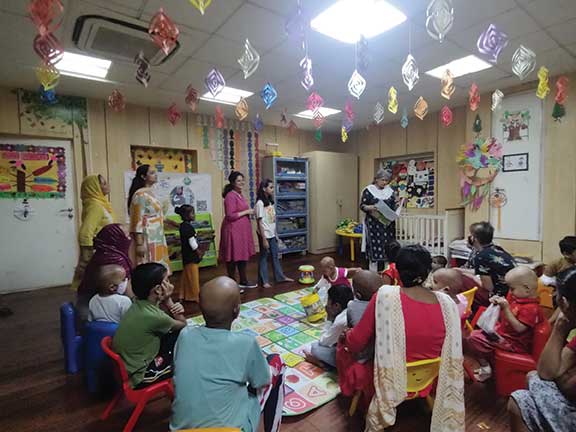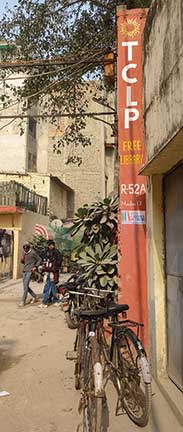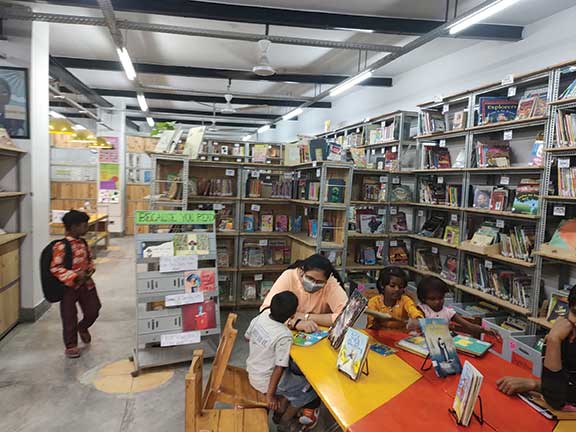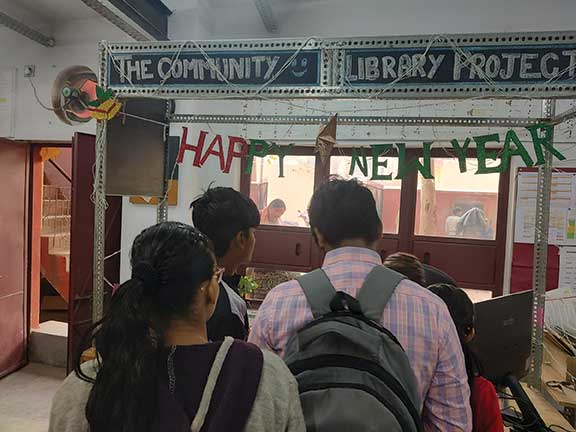Richa Dang
As the popular saying goes, ‘it takes a village to raise a child’. Evolving demographics and geographies have given new meanings to ‘village’, including its communities, institutions, and neighbourhoods. However, what remains the same is the collective effort it takes to build a better future and stronger foundation for the coming generations.
Here I will share how neighbourhood initiatives create spaces for bonding, growth, expression and most of all an escape into the alternate and more accepting world of books. My work gave me the opportunity to closely follow both these initiatives which are helping in bringing together and strengthening communities.
Archana Atri, more than a decade ago, extended her interest in reading and books to form a book club for children. This was long before reading clubs and book clubs were common and popular spaces in our cities. Starting with just a couple of children, her dedication and passion saw her book reading club steadily gather more members and popularity. AA’s Book Nerds as they call themselves didn’t just improve their language skills at these sessions but Atri’s selection of texts and follow up discussions opened for them opportunities – they learnt to challenge, to critique, to analyze, and to think about the possibilities that lay ahead. She helps them find their voice and express their opinion. Unlike the ritualistic treatment of language in schools, here they learn to use language as a tool.

However, it is another project of hers, Adi’s Corner, that first acquainted me with her zeal. Named after her husband, who egged her on to extend her passion for books into a profession, Atri embarked on this journey in his memory. It is a small and vibrant library on the third floor of the pediatric oncology facility of a speciality hospital for children in NOIDA. She has about a hundred titles for children in Adi’s Corner. She regularly visits the hospital to conduct storytelling sessions for the children and their caregivers. Her grey hair, warm smile, and endearing stories have earned her the moniker ‘kahani wali nani’.
Children admitted at the facility along with those who come to the OPD look forward to these sessions with kahani wali nani. The room which houses Adi’s Corner along with other play material, mats, and toys is maintained by the members of the NGO CanKids. Children are encouraged to access the room and engage with all kinds of material available there including the books.
On one of Atri’s visits to the Corner, I heard a lady, from the NGO, who works closely with these kids, smile and say, “Aaj bache theek se khana khayenge” (Children will eat properly today). The hospital provides lunch to those who are admitted there but most cannot eat easily because of the nature of the treatment they are undergoing. However, after an enjoyable story session they complain less and eat without throwing tantrums.
Atri’s way of remembering her husband, who lost his life to cancer, is in not just giving these children strength to deal with this malady but also to be hopeful and look forward to something when this ordeal is over. A girl whose head had been shaved for chemotherapy sobbed continuously and refused to meet anyone. When told that kahani wali nani has come to the hospital she wanted to attend but hesitated. A little encouragement from her favourite kahani wali nani and a story of a brave princess helped her get her confidence back. She has since joined school now that she is completely healed and bravely attends her classes with her shorn hair. Atri’s dedication for Adi’s Corner is evident in her words and actions. During a story session she remarked, “Yeh kitaab bachon ko bahut pasand hai, dekho iski dono copies phatt rahi hain”, (children like these books, both copies of the book are damaged), I will replace it next time.” She was looking at books and was happy to come across a well-used book with dog eared, loose pages. This space coupled with story sessions is a source of joy and satisfaction for Atri. It is also a way for caregivers to form camaraderie and share their experiences of joy and pain with each other.
In the company of books from Adi’s Corner and kahani wali nani’s stories children find their moments of smiles and courage to defeat this deadly disease.

TCLP
The Community Library Project (TCLP), as its name suggests, is a library which offers free membership to anyone and everyone who is interested. A part of the Free Library Network (FLN), TCLP has three libraries in Delhi. At the core of these libraries is the value of offering easy access to books and space for reading, discussions, and community interactions among all the members of the society. They primarily cater to children and young adults but adults too are also welcome to join these libraries as members. These well-stocked libraries have both Indian and international literature, fiction, nonfiction, poetry, travelogues, reference books for exam preparation among others.
I had the opportunity to engage with members, staff, and volunteers at the TCLP library at Khirki. The most unique aspect of this library is the neighbourhood in which it is operating. Khirki has sizeable Afghani and African population. It is not unusual to see members of different ethnicities frequenting the library and stopping by for small conversations or seeking help from the volunteers. The place brings together the people living in the neighbourhood, but who are otherwise separated by identities, biases, and ignorance.
One of the flagship programmes of TCLP is sharing the onus of maintaining the library with the members. Members with longer association are encouraged to volunteer to maintain racks, shelves, and the books. Also, the cleaning, dusting, sweeping responsibilities are divided among all the staff and volunteers. On one of my visits, I saw the director of the project cleaning the washroom and on another I had an interesting conversation with the creative head when she reported early to sweep the floor and rearrange the shelves. It wasn’t uncommon to see members, especially new ones and younger kids being reminded about the proper way to use toilets, water taps leaving these areas clean and avoiding wastage of water and electricity. The level of awareness among members was such that for almost three months I rarely noticed lights switched on unnecessarily or taps running when not in use.

In an attempt to further democratise the system, food at the library is cooked by a staff member. It is prepared in a small kitchen adjoining the reading room and the staff and volunteers eat together in the kitchen. Extending this initiative of providing healthy options and normalizing eating together, TCLP has a programme for its members as well. Members are offered a fruit each, occasionally a chocolate, or a candy, or a cookie at the issue and return desk. This according to staff members encourages the members to get the books issued and bring them back once they have read it. In a way it is an incentive for children to keep the cycle of issuing books, reading them and then returning them safely, going. In addition, it also helps the ones coming directly from school or those coming without breakfast curb the hunger. Sometimes I observed the children asking for a fruit without either issuing or returning the book, the staff or volunteer at desk give them the fruit but not before encouraging them to read more books. The in-charge at Khirki conveyed that they understand children’s affinity to sweets and chocolates. However, they decided to consciously include more fruits as they are keen to ensure that children develop healthy eating habits by choosing nutritionally rich food over sugary snacks. The library practices are not preachy. Instead, they are partial to performing the right actions now to influence the children’s choices in the right direction later.
The library also boasts of a computer room where children can also play video games. These are monitored to weed out inappropriate content. Their motive is clear – they want to help children access technology and learn the new advancements but not in an unregulated manner which may prove unsafe and damaging for them. The library routinely runs reading programmes for children who find it difficult to read. Read-aloud and story sessions are planned on a routine basis. Children do not shy away from demanding story reading sessions, apart from the ones scheduled, from the volunteers, who happily comply. Other popular sessions/workshops are on art, sketching, painting, craft, and drama. These are special workshops organized by volunteers from NGO’s or independent adults who find ways to give back to the society by engaging with children through this neighbourhood library.

It is a common sight to see small kids loitering around the racks and reading room. Slowly as they sneak up to attend read-aloud and are welcomed at story session they realize that they are not lost. They belong and are welcome here. This first step opens up a new world of words and friendships for them. At TCLP, the management is sensitive and understands that a library is much more than just a reading space. They are open throughout the week as they realize that for many members it is a place that offers peace, space to be, a home away from home. No wonder most of the members grow up to volunteer part time and many of them keep finding ways to continue their association with this library in one way or other. It offers both solitude and companionship depending on what one is looking for.
Heaps have been written about the transformative power of books. Those of us who read are not untouched by the magic of a book, which absorbs us with its pictures, smell, and words. We need to find ways to get others to experience this magic too. This may enable them to savour this pleasure, to grow as individuals, to respect differences and a lot more. And perhaps, some of them may also pass on this magic to those around and create more smiles.
The author is a doctoral researcher, working in the area of children’s literature. She is working as a teacher in a Delhi government school. She can be contacted at divincarnate@gmail.com.
